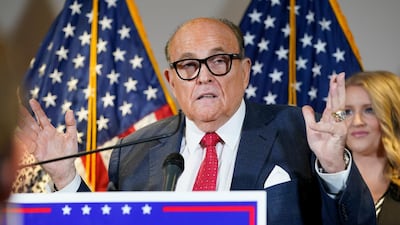President Donald Trump's personal lawyer, former New York mayor Rudy Giuliani, is asking him for a pre-emptive pardon before he leaves office, The New York Times reported on Tuesday.
Mr Giuliani denied the report, writing on Twitter that he “never had the discussion they falsely attribute to an anonymous source”.
But federal prosecutors in New York launched an investigation last year into his role in an alleged pressure campaign to convince the Ukrainian government to investigate Hunter Biden, president-elect Joe Biden’s son.
US prosecutors are also looking into whether Mr Giuliani was working for Ukrainian officials who wanted to remove US ambassador Marie Yovanovitch, the target of several presidential attacks during Mr Trump’s impeachment proceedings.
There are reports that Mr Trump is planning more pardons for his political allies before he leaves office, after he granted clemency in the past week for Michael Flynn, his former national security adviser who was convicted of lying to the FBI.
There are plenty of precedents for presidents granting pre-emptive pardons to their political allies.
"The idea of a pre-emptive pardon is the idea that somebody is suspected of wrongdoing, but that person hasn't been prosecuted and indicted," Anthony Marcum, a resident fellow at the R Street Institute in Washington, told The National.
“The president can still offer a pardon of that wrongdoing.”
The US Supreme Court ruled in 1866 that pre-emptive pardons were permissible under the Constitution.
“This is nothing new,” Mr Marcum said. “Presidents have used this power before to aid and help political allies.
"Whether that’s advisable and whether this is proper is an entirely different story.”
Former president George HW Bush pre-emptively pardoned defence secretary Caspar Weinberger weeks before he was scheduled to stand trial for his role in the Iran-Contra scandal.
Mr Bush also pardoned Elliot Abrams, Mr Trump’s current Iran and Venezuela policy co-ordinator, after he pleaded guilty to withholding information from Congress in the Iran-Contra affair.
And former president Gerald Ford pre-emptively pardoned his predecessor, Richard Nixon, for all his actions as president.
“It depends on the context, of course, and the situation, but pardons for the sake of helping a political ally is a misuse of the pardon power,” Mr Marcum said.
Presidents have not always used pardons, pre-emptive or otherwise, solely for their political allies.
Former president Jimmy Carter granted pardons to hundreds of thousands of Americans who had evaded the draft in the Vietnam War, some of whom had not yet been charged.
And former president Abraham Lincoln pre-emptively pardoned several Confederate soldiers after the American Civil War.
CNN also reported last month that Mr Trump has repeatedly asked about whether it is possible to pardon himself – something that is much more legally dubious.
“It’s incredibly legally murky and there are a number of opinions on it in legal circles,” Mr Marcum said.
“The question is still an uncertain one because it’s never been done before.”


